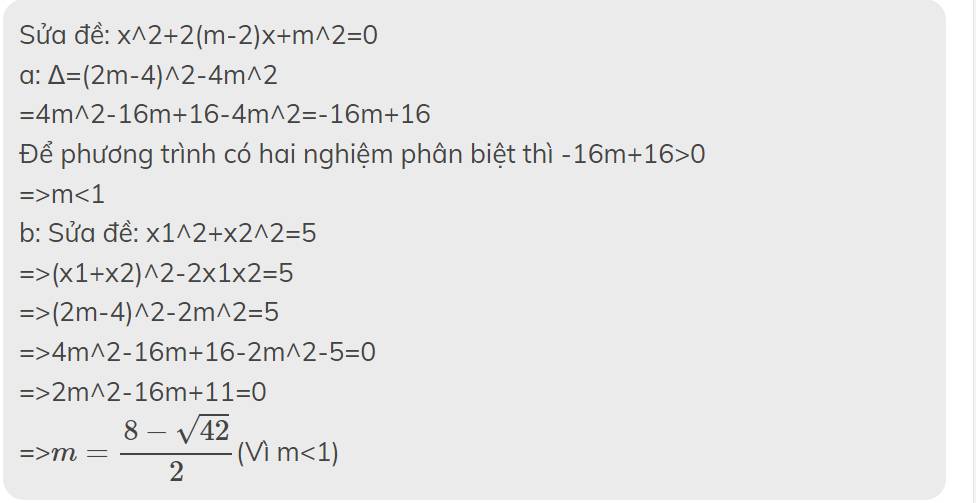cho pt mx^2-mx+m-1=0 goi x1 x2 la 2 ngiem cua pt dat a= x1^2+x2^2-6x1x2 tim m de a dat gt nho nhat
Hãy nhập câu hỏi của bạn vào đây, nếu là tài khoản VIP, bạn sẽ được ưu tiên trả lời.


Sửa đề: x^2+2(m-2)x+m^2=0
a: Δ=(2m-4)^2-4m^2
=4m^2-16m+16-4m^2=-16m+16
Để phương trình có hai nghiệm phân biệt thì -16m+16>0
=>m<1
b: Sửa đề: x1^2+x2^2=5
=>(x1+x2)^2-2x1x2=5
=>(2m-4)^2-2m^2=5
=>4m^2-16m+16-2m^2-5=0
=>2m^2-16m+11=0
=>\(m=\dfrac{8-\sqrt{42}}{2}\)(Vì m<1)

\(\Delta=b^2-4ac\)
=m2-(4(1.m))
=m(m-4)\(\ge\)0
=>pt có x1,x2
b)tự làm


PT có 2 nghiệm phân biệt
\(\Leftrightarrow\text{Δ}>0\Leftrightarrow\left(2m\right)^2-4.\left(m+1\right)\left(m-1\right)>0\)
\(\Leftrightarrow4m^2-4\left(m^2-1\right)>0\Leftrightarrow4>0\)(luôn đúng)
Vậy PT luôn có 2 nghiệm phân biệt
Theo hệ thức Viét ta có:
\(\left\{{}\begin{matrix}x_1+x_2=-\dfrac{2m}{m+1}\\x_1.x_2=\dfrac{m-1}{m+1}\end{matrix}\right.\)
Mà theo GT thì ta có:
\(x_1^2+x_2^2=5\)
\(\Leftrightarrow\left(x_1+x_2\right)^2-2x_1.x_2=5\)
\(\Leftrightarrow\left(\dfrac{-2m}{m+1}\right)^2-2.\dfrac{m-1}{m+1}=5\)
\(\Leftrightarrow\dfrac{4m^2}{\left(m+1\right)^2}-\dfrac{2\left(m-1\right)}{m+1}=5\)
\(\Leftrightarrow\dfrac{1}{m+1}\left[\dfrac{4m^2}{m+1}-2\left(m-1\right)\right]=5\)
\(\Leftrightarrow\dfrac{2m^2+2}{m^2+2m+1}=5\)
\(\Leftrightarrow2m^2+2=5m^2+10m+5\)
\(\Leftrightarrow3m^2+10m+3=0\)
\(\Leftrightarrow\left[{}\begin{matrix}m=-\dfrac{1}{3}\\m=-3\end{matrix}\right.\)

a: \(\text{Δ}=\left(4m-4\right)^2-4\left(-4m+10\right)\)
\(=16m^2-32m+16+16m-40\)
\(=16m^2-16m-24\)
\(=8\left(2m^2-2m-3\right)\)
Để pT có nghiệm kép thì \(2m^2-2m-3=0\)
hay \(m\in\left\{\dfrac{1+\sqrt{7}}{2};\dfrac{1-\sqrt{7}}{2}\right\}\)
b: Thay x=2 vào PT, ta được:
\(4+8\left(m-1\right)-4m+10=0\)
=>8m-8-4m+14=0
=>4m+6=0
hay m=-3/2
Theo VI-et, ta được: \(x_1+x_2=-4\left(m-1\right)=-4\cdot\dfrac{-5}{2}=10\)
=>x2=8

Pt có 2 nghiệm khi: \(\left\{{}\begin{matrix}m\ne0\\\Delta=m^2-4m\left(m-1\right)\ge0\end{matrix}\right.\) \(\Leftrightarrow0< m\le\dfrac{4}{3}\)
Theo hệ thức Viet: \(\left\{{}\begin{matrix}x_1+x_2=1\\x_1x_2=\dfrac{m-1}{m}=1-\dfrac{1}{m}\end{matrix}\right.\)
\(A=x_1^2+x_2^2-6x_1x_2=\left(x_1+x_2\right)^2-8x_1x_2\)
\(A=1-8\left(1-\dfrac{1}{m}\right)=\dfrac{8}{m}-7\)
Do \(0< m\le\dfrac{4}{3}\Rightarrow\dfrac{8}{m}\ge\dfrac{8}{\dfrac{4}{3}}=6\)
\(\Rightarrow A\ge6-7=-1\)
\(A_{min}=-1\) khi \(m=\dfrac{4}{3}\)